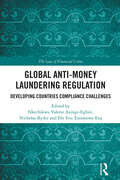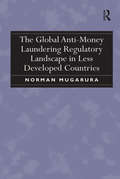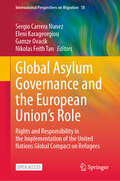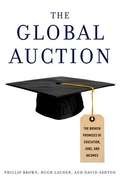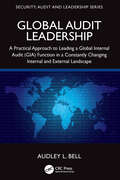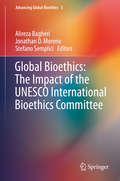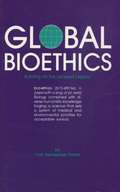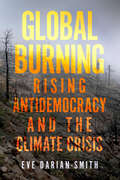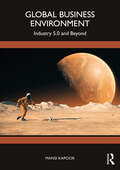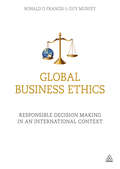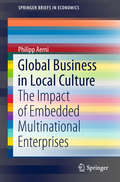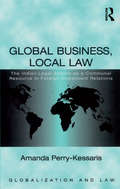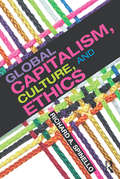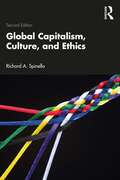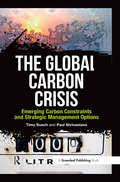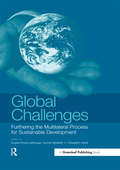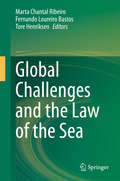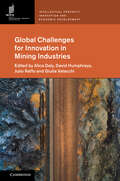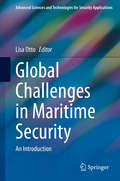- Table View
- List View
Global Anti-Money Laundering Regulation: Developing Countries Compliance Challenges (The Law of Financial Crime)
by Nkechikwu Valerie Azinge-Egbiri Nicholas Ryder Ehi Eric Esoimeme EsqThis book explores the politics of money laundering and terrorist financing (ML/TF) regulation in several countries across Africa and the Small Island States. Developed countries created the Financial Action Task Force (FATF) to combat ML/TF globally. Expectedly, the FATF’s standards mirror existing banking regulations within the G7 countries. Yet, the standards apply to all countries irrespective of the limited ML/TF risks they pose to the global economy, their weak pre-conditions for effective regulation and their non-involvement in the FATF’s framing. Still, such countries, mainly within the Global South, have worked hard to amplify their compliance with the regime due to fears of the repercussions of their non-compliance. This collection demonstrates how the global ML/TF regulation is treated as an implicitly superior legal regime where the Global South must comply irrespective of their perception of the FATF’s legitimacy challenges. It shows that beyond exogenous factors such as neo-colonialism, endogenous factors such as weak institutions and corruption undermine the compliance trajectory of the Global South. Furthermore, it analyses the unintended consequences of transplanting FATF standards into diverse legal and cultural contexts. The volume contributes to our understanding of the challenges of transplantation from the Global North and how the Global South is steering within the constraints created by the FATF. It advocates for a comprehensive understanding of the nuanced compliance challenges of developing countries. It further proposes practical solutions to address them, emphasizing the importance of risk-based understanding, accountability, capacity-building and coordination in achieving effective anti-money laundering and counter-terrorist financing measures. The collection will be essential reading for researchers, academics and policy-makers working in financial crime regulation and international economic law.
The Global Anti-Money Laundering Regulatory Landscape in Less Developed Countries
by Norman MugaruraExamining the challenges of using the global anti-money laundering (AML) framework in an uneven global regulatory landscape, this book discusses the difficulties of relating de-regulation, liberalization and conflict of laws to the dynamics of the market economy and demonstrates how the global environment engenders money laundering. It suggests that corruption, general systemic failure and lack of infrastructural capacity in some developing economies are hampering the implementation of laws and regulations. Suggesting that these challenges can be overcome by designing AML regimes more suited to developing economies within the prevailing global climate, the book questions the assumption that that global regimes will be applicable and emphasises the need for more representation of developing economies on the relevant committees. This book is the first of its kind to present the perspective of developing economies and their involvement in AML regimes and should be of interest to those involved in business and commercial law as well as comparative law.
Global Anti-Terrorism Law and Policy
by Michael Hor Kent Roach George Williams Victor V. RamrajPreventing acts of terrorism remains one of the major tasks of domestic governments and regional and international organisations. Terrorism transcends borders, so anti-terrorism law must cross the boundaries of domestic, regional and international law. It also crosses traditional disciplinary boundaries between administrative, constitutional, criminal, financial, immigration, international and military law, as well as the law of war. This second edition provides a comprehensive resource on how domestic, regional and international responses to terrorism have developed since 2001. Chapters that focus on a particular country or region in the Americas, Europe, Africa and Asia are complemented by overarching thematic chapters that take a comparative approach to particular aspects of anti-terrorism law and policy.
Global Approaches to Site Contamination Law
by Elizabeth BrandonThe book describes the complex and variable laws addressing site contamination, reviewing existing international, regional and national law of relevance to site contamination. It also offers detailed case studies of national approaches to the issue, and goes on to explore avenues for promoting the development of comprehensive domestic laws on site contamination, with a focus on the role of international law and actors. A detailed discussion analyzes such variations as a binding international legal instrument, a non-binding instrument, and a model framework for site contamination management. The text includes recommendations regarding the key elements needed for regulating site contamination at the national level. The author also offers an appropriate and feasible timetable for international action to promote better national law and policy regarding contaminated sites.
Global Asylum Governance and the European Union's Role: Rights and Responsibility in the Implementation of the United Nations Global Compact on Refugees (International Perspectives on Migration #18)
by Sergio Carrera Nunez Eleni Karageorgiou Gamze Ovacik Nikolas Feith TanThis open access book provides a state-of-the-field of the interactions between emerging national asylum governance systems and the 2018 United Nations Global Compact for Refugees (UN GCR). It provides a detailed examination of the relationship and compatibility between asylum governance and refugee protection and human rights, and the responsibilities for states and other implementing actors in cases of human rights violations. This book analyses the characteristics and impacts of existing and emerging asylum governance instruments and their practical implementation in selected countries hosting large communities of refugees around the world. Particular focus is given to the cases of Bangladesh, Brazil, Canada, Jordan, Niger, Serbia, South Africa and Turkey. Attention is put into regional and country-specific asylum instruments and actors from the perspective of their effectiveness, fairness and consistency with refugee protection and human rights standards as well as the UN GCR commitments. By doing so, the book identifies key lessons learned and offers a critical view on policies framed as `promising practices' so as to inform future steps in the UN GCR implementation and asylum governance more generally. As such, the book provides a better understanding of the concept of “mobility” in asylum governance, and the ways in which it is articulated into legal and policy instruments framed as "protection" and - in the language of the UN GCR - “third country solutions” for refugee mobility, including resettlement, private/community sponsorships, humanitarian corridors, in the European Union and around the world.
The Global Auction: The Broken Promises of Education, Jobs, and Incomes
by Phillip Brown Hugh Lauder David AshtonFor decades, the idea that more education will lead to greater individual and national prosperity has been a cornerstone of developed economies. Indeed, it is almost universally believed that college diplomas give Americans and Europeans a competitive advantage in the global knowledge wars. Challenging this conventional wisdom, The Global Auction forces us to reconsider our deeply held and mistaken views about how the global economy really works and how to thrive in it. Drawing on cutting-edge research based on a major international study, the authors show that the competition for good, middle-class jobs is now a worldwide competition--an auction for cut-priced brainpower--fueled by an explosion of higher education across the world. They highlight a fundamental power shift in favor of corporate bosses and emerging economies such as China and India, a change that is driving the new global high-skill, low-wage workforce. Fighting for a dwindling supply of good jobs will compel the middle classes to devote more time, money, and effort to set themselves apart in a bare-knuckle competition that will leave many disappointed. The authors urge a new conversation about the kind of society we want to live in and about the kind of global economy that can benefit workers, but without condemning millions in emerging economies to a life of poverty. The Global Auction is a radical rethinking of the ideas that stand at the heart of the American Dream. It offers a timely exposé of the realities of the global struggle for middle class jobs, a competition that threatens the livelihoods of millions of American and European workers and their families.
Global Audit Leadership: A Practical Approach to Leading a Global Internal Audit (GIA) Function in a Constantly Changing Internal and External Landscape (ISSN)
by Audley L. BellLeaders across the globe have a common challenge they cannot ignore: CHANGE. This must be embraced and effectively managed to remain relevant and successful in a dynamic operating environment. Embracing change, including technological innovations, collaboration, and timely sharing of information, is paramount to the survival and success of everyone in an ever-changing environment.In times of rapid change, organizations are often forced to adjust their strategic plans. Stakeholders usually need assistance to effectively manage the risks, unprecedented at times, and to capitalize on the opportunities that usually come with change. Change management must be effectively executed to assist in ensuring the viability of the organization.This book provides advice and guidance to assist stakeholders in navigating the challenges and demands of change. It includes insights, measures, and tools that have contributed to my success as a leader in the internal audit profession for 27 years.
Global Bioethics: The Impact of the UNESCO International Bioethics Committee
by Alireza Bagheri Jonathan D. Moreno Stefano SempliciThe UNESCO International Bioethics Committee is an international body that sets standards in the field of bioethics. This collection represents the contributions of the IBC to global bioethics. The IBC is a body of 36 independent experts that follows progress in the life sciences and its applications in order to ensure respect for human dignity and freedom. Currently, some of the topics of the IBC contributions have been discussed in the bioethics literature, mostly journal articles. However, this is a unique contribution by the scholars who developed these universal declarations and reports. The contributors have not only provided a scholarly up to date discussion of their research topics, but as members of the IBC they have also discussed specific practical challenges in the development of such international documents. This book will be suited to academics within bioethics, health care policy and international law.
Global Bioethics: Building on the Leopold Legacy
by Van Rensselaer PotterThis book on Bioethics discusses regarding the Leopold legacy, human survival, dilemmas in ecological Bioethics, two kinds of bioethics, dilemmas in medical bioethics, the control of human fertility and global bioethics defined. Appendix includes the Leopold heritage and a bioethical creed for individuals.
Global Boards
by Andrew Kakabadse Nada KakabadseProviding an insightful and challenging view of board functioning, governance application and top director interaction with business and the state. Scrutiny of board practice in countries as China, Russia, Turkey and Kazakhstan, establishes as many realities concerning governance and boards as there are nations, cultures, boards and directors.
The Global Body Market
by Michele GoodwinThe dark side of body part trading operates in a dynamic fashion, full of mystery, intrigue, and ambition. On the one hand, black and gray markets are illegal, but also pioneering and inventive; and although this type of criminal activity requires a level of dexterity and innovation, the point should not be lost that these markets thrive and flourish, sometimes in view of law. On the other hand, altruistic body part procurement is mired by low participation, which encourages black market transactions. Thousands of sick patients die each year without the hope of receiving an organ or bone marrow donation through the altruistic procurement system, so they turn to the dark side. This book offers a frank conversation about altruism in the global body market. It exposes how researchers exploit their patients' ignorance to harvest tissue samples, blood, and other biologics without consent for research and patent development. The book chronicles exploitation in the name of altruism, including the nonconsensual use of children in dangerous clinical trials, and analyzes social and legal commitments to the value of altruism - offering an important critique of the vulnerability of altruism to corruption, coercion, pressure, and other negative externalities.
Global Burning: Rising Antidemocracy and the Climate Crisis
by Eve Darian-SmithHow extreme-right antidemocratic governments around the world are prioritizing profits over citizens, stoking catastrophic wildfires, and accelerating global climate change. Recent years have seen out-of-control wildfires rage across remote Brazilian rainforests, densely populated California coastlines, and major cities in Australia. What connects these separate events is more than immediate devastation and human loss of life. In Global Burning, Eve Darian-Smith contends that using fire as a symbolic and literal thread connecting different places around the world allows us to better understand the parallel, and related, trends of the growth of authoritarian politics and climate crises and their interconnected global consequences. Darian-Smith looks deeply into each of these three cases of catastrophic wildfires and finds key similarities in all of them. As political leaders and big business work together in the pursuit of profits and power, anti-environmentalism has become an essential political tool enabling the rise of extreme right governments and energizing their populist supporters. These are the governments that deny climate science, reject environmental protection laws, and foster exclusionary worldviews that exacerbate climate injustice. The fires in Australia, Brazil and the United States demand acknowledgment of the global systems of inequality that undergird them, connecting the political erosion of liberal democracy with the corrosion of the environment. Darian-Smith argues that these wildfires are closely linked through capitalism, colonialism, industrialization, and resource extraction. In thinking through wildfires as environmental and political phenomenon, Global Burning challenges readers to confront the interlocking powers that are ensuring our future ecological collapse.
Global Business Environment: Industry 5.0 and Beyond
by Mansi KapoorThis book discusses the shifting paradigms in global business environment from the Fourth Industrial Revolution (Industry 4.0) to the Fifth Industrial Revolution (Industry 5.0). It captures the current shifts in the global environment for business caused mainly by the disruptive nature of rapid technological advancements and the consequences of globalisation, which impact political, social and economic changes.Divided into six sections—Political, Economic, Socio-Cultural, Technological, Ethical & Environmental, this book attempts to build perspectives on current trends sweeping globally across political, technological, socio-cultural and economic landscapes. Furnished with up-to-date examples and case studies, it presents an exhaustive yet lucid view of current socio-economic realities, the latest technological advancements, political undercurrents, and the issues and challenges confronting organisations and institutions both globally and locally. It is a compelling narrative based on ongoing years of deep research, cases, theoretical frameworks and insights that can help navigate what seems like an unimaginable future.This book will be useful to students, researchers and teachers of management, economics, liberal arts and related social sciences disciplines. It will also be a useful reference for those studying Public Policy and Law.
Global Business Ethics
by Guy Murfey Ronald D FrancisCorporate social responsibility, sustainability and acting ethically are all accepted business aims, but their meaning and implementation in a global context is far less clear-cut. Global Business Ethics cuts through the confusion to provide a coherent basis for ethical decision-making within the complications of the international business landscape. Underpinned by theory and including worked-through examples of ethical dilemmas and their solutions, this textbook will guide the reader beyond theory to real-world business decisions. Practical tools such as decision trees and suggested principles to apply in dilemma situations give readers the skills and confidence to tackle the ethical challenges they face. A unique working code of ethics is provided as a model with guidance to readers for adaptation and implementation. Case studies include: Walmart, Hershey's, Citibank, Ford, Nike, Johnson & Johnson, Harley- Davidson, The Body Shop and Procter and Gamble. A chapter on the legal aspects of ethics provides clear guidance on the complex relationship between law and ethics in international business. The final part takes an in-depth look at the practical application of ethics in business life. Covering all the major theories of ethics, including an examination of the role of quantification of ethics, Global Business Ethics demonstrates how their principles can be applied to inform better business decisions.
Global Business in Local Culture: The Impact Of Embedded Multinational Enterprises (SpringerBriefs in Economics)
by Philipp AerniThis book examines the impact of multinational enterprises (MNEs) on local economies, and presents selected case studies of MNEs operating in low income countries. By balancing external social and environmental costs against its corresponding benefits, the book demonstrates that MNEs can have a positive net-impact on local development if they build up social capital by embedding themselves in local economies and engaging responsibly with local stakeholders. By doing so MNEs contribute to inclusive growth, a cental pillar of the UN Sustainable Development Goals. In this context, the book challenges popular narratives in civil society and academia that frame foreign direct investment (FDI) merely as a threat to human rights and sustainable development. Moreover, it offers practical guidance for globally operating businesses seeking to establish progressive Corporate Social Responsibility (CSR) strategies of their own.
Global Business, Local Law: The Indian Legal System as a Communal Resource in Foreign Investment Relations (Globalization And Law Ser.)
by Amanda Perry-KessarisThis volume establishes a theoretical framework for exploring the role of host state legal systems (courts and bureaucracies) in mediating relations between foreign investment, civil society and government actors. It then demonstrates the application of that framework in the context of the south Indian city of Bengaluru (formerly Bangalore). Drawing on the 'law-and-community' approach of Roger Cotterrell, the volume identifies three mechanisms through which law might, in theory, ensure that social relations are productive: by expressing any mutual trust which may hold actors together, by ensuring that actors participate fully in social life and by coordinating the differences that hold actors apart. Empirical data reveals that each of these legal mechanisms is at work in Bengaluru. However, their operation is limited and skewed by the extent to which actors use, abuse and/or avoid them. Furthermore, these legal mechanisms are being eroded as a direct result of the World Bank's 'investment climate' discourse, which privileges the interests and values of foreign investors over those of other actors.
Global Business Regulation
by John Braith Waite Peter DrahosAcross an amazing sweep of the critical areas of business regulation - from contract, intellectual property and corporations law, to trade, telecommunications, labour standards, drugs, food, transport and environment - this book confronts the question of how the regulation of business has shifted from national to global institutions. Based on interviews with 500 international leaders in business and government, this book examines the role played by global institutions such as the WTO, the OECD, IMF, Moody's and the World Bank, as well as various NGOs and significant individuals. The authors argue that effective and decent global regulation depends on the determination of individuals to engage with powerful agendas and decision-making bodies that would otherwise be dominated by concentrated economic interests. This book will become a standard reference for readers in business, law, politics and international relations.
Global Capitalism, Culture, and Ethics
by Richard SpinelloSelected as an Outstanding Academic Title by Choice Magazine in 2014! This book aims to deepen the student’s understanding of the complex ethical challenges that businesses face in an increasingly globalized world. As the world moves towards greater interdependence, it has been demonstrated that globalization is linked to economic growth. This raises a critical question: as a key player in fostering economic growth, how does the multinational corporation function as a moral agent? Global Capitalism, Culture, and Ethics offers a sophisticated analysis of theoretical ethical issues such as universalism versus pluralism; the connection between law and morality; the validity of a corporate social agenda; and the general parameters of moral responsibilities for multinational corporations. With these foundational issues addressed, the book proceeds to analyze a number of specific controversies such as the proper scope of political activism, disinvestment, environmental sustainability, and responsible sourcing from low wage countries. The analysis of globalization is not confined to a treatment of the moral obligations of multinational corporations, but also reviews the history of global capitalism, the interdependence between governments and multinational corporations, and the beneficial and harmful effects of globalization on social welfare. Weaving together themes from economics, history, philosophy, and law, this book allows the reader to appreciate globalization from multiple perspectives. Its theoretical cogency and uncompromising clarity make it a rewarding read for students interested in issues of ethics and globalization.
Global Capitalism, Culture, and Ethics
by Richard A. SpinelloThis book seeks to deepen the reader’s understanding of the complex ethical and social disputes that corporations and managers face in an increasingly globalized world. It reviews the history and nature of global capitalism along with the role of the multinational within the global economy. Special attention is paid to emerging and frontier markets where there is economic potential but also major challenges due to institutional voids. Globalization is a constantly evolving field. In addition to exploring basic economic concepts and ethical frameworks, this second edition takes into account many new developments across different industries, ranging from "Big Tech" to "Big Pharma." It reviews some of the controversies that have affected those industries including bribery, censorship, the politics of computer networking, sweatshops, divestment, and the intensifying crisis of climate change. The book now includes short case studies to help spur creative reflection. Also, the revised content is highlighted in two new chapters – "Bribery and Corruption" and "Emerging and Frontier Markets." The book is ideal for use as a textbook on globalization, and specifically for courses that want to introduce a social responsibility or ethical component at both undergraduate and postgraduate levels.
The Global Carbon Crisis: Emerging Carbon Constraints and Strategic Management Options
by Timo Busch Paul ShrivastavaFor at least a decade the science of climate change has warned us of the dire need for action – particularly by corporations who are the main engines of economic production and consumption. Yet managerial and corporate understanding of climate change and related energy issues remains fragmented and present actions lack the urgency this critical problem deserves. There is a whole new economy – the low-carbon economy – looming on the horizon. But our consumption and production patterns remain in a carbon-locked position. What we are risking is a global carbon crisis and a case of history repeating. Humankind's failure to adequately recognise the onset of and address the effects of the global financial crisis mirrors our similar failures with the carbon crisis. There are many parallels: both are and were predictable and both will have direct implications on humanity on a sweeping, indiscriminate and severe scale. The difference is that we cannot reverse the effects of climate change and fossil fuel scarcity as easily as we can repair the global financial system. It is of paramount importance that we wake up to the risks and begin tackling the issues early enough. To successfully address the risks, business needs to be aware of the consequences that a changing climate and finite carbon resources will have on their business performance. The element carbon – both as a resource and as an emission – is both an economic threat as well as an opportunity for companies. It is a threat for carbon-intense production systems that will need to be changed to avoid further harmful climatic change, and take into account the limited availability of carbon-based fuels. At the same time, new opportunities will emerge for companies who can creatively design and produce goods and services that fit the new emerging carbon-constrained business environment. Many sectors of the economy – for example, renewable energy, energy and resources conservation, waste reduction and management, carbon finance markets – will expand rapidly, as other carbon- and resource-intensive sectors decline. The Global Carbon Crisis succinctly translates important insights from the natural sciences, economics and equity discussions, for the business reader. It reviews important aspects of these discussions and clarifies misunderstandings with respect to climate change and fossil fuel availability and their implications for business. The book provides simple, direct, pragmatic and effective solutions that policy-makers and corporate managers can implement. The aim is to provoke action – thoughtful action – towards developing a low-carbon future for companies on three levels. At the macro level, the authors discuss the importance of tough industrial policies for climate change and propose the idea of an international carbon-equal fund. At the meso level, they elaborate on the role of inter-firm collaborations for establishing low-carbon industries and production systems. At the micro level, they illustrate the virtue of proactive carbon strategies and suggest a corporate carbon management framework. Getting the message of the carbon crisis across to a business audience has proved challenging. This book successfully makes the case that they are intricately connected to one another and practising managers and business students will benefit from viewing the carbon crisis in parallel to the financial meltdown. The book will be essential reading for all businesses grappling with carbon-related issues and for many in academia, including those in management, strategy, finance, corporate social responsibility and sustainable development, globalisation and innovation studies.
Global Challenges: Furthering the Multilateral Process for Sustainable Development
by Angela Churie Kallhauge, Gunnar Sjöstedt and Elisabeth CorellThe World Summit on Sustainable Development (WSSD) in Johannesburg 2002 was the latest conference in an international process to manage environment and development issues that can be traced back to the late 1960s. Three milestones mark this 30-year process of social and political interaction: the United Nations Conference on the Human Environment (UNCHE), held in Stockholm in 1972, the first international meeting at a high political level convened to address environmental issues; the 1992 United Nations Conference on Environment and Development (UNCED), held in Rio de Janeiro; and the WSSD, which attempted to set policy goals and targets for the global environmental and developmental challenges previously identified.But what did the WSSD achieve? Following the summit there have been various opinions of its significance and its outputs, many of them negative. This book argues that there is a need to place the WSSD in its broader context. Understanding the connections between the WSSD and its precedents as well as those between this overall process and individual environmental decision-making processes (such as on climate change), and how they all contribute to the overall global policy process, adds a critical dimension to the analysis of the WSSD outcomes.This book examines the challenges facing the global policy process for sustainable development as it continues beyond Johannesburg into the future. It combines a forward outlook with a historical perspective in tracing the evolution of selected cross-cutting themes on the agenda of the three conferences, the institutions and formal results of the process, and the actors and their patterns of interaction over time. The focus is on the decision-making dimension – the multilateral negotiations-which can be seen as the development over time of a pattern of interlinked political activities.Global Challenges has four operational objectives: first, to define the ongoing process that formally began with the Stockholm Conference in 1972 and evolved towards its latest major manifestation at the WSSD; second, to present some dynamics of the Stockholm–Rio–Johannesburg (SRJ) process by exploring the themes identified; third, to introduce an approach on how to consider the outcomes of this process as a way of reflecting on what the process has actually accomplished; and, finally, to discuss lessons learned for theory and practice from this exercise. The practical lessons include reflections on how the continued SRJ process should best be organised and supported into the future.The book takes a uniquely broad outlook and interdisciplinary approach in addressing important lessons relating to the emergence of substantive issues as well as to process and institutional dynamics. It is a bridge-building exercise from academic analysis to long-term strategic thinking in environmental regime building.Global Challenges provides a new perspective on the continuing and increasingly complex global environment and development policy process and analyses the interlinkages between the process, trends and cross-cutting issues that set the conditions for the global efforts to achieve sustainable development. It will be essential reading for academics and practitioners interested in seeing the big picture of the global challenges facing people and planet in the 21st century.
Global Challenges and the Law of the Sea
by Marta Chantal Ribeiro Fernando Loureiro Bastos Tore HenriksenThis book analyses a selection of challenges in the implementation and application of the 1982 UN Convention on the Law of the Sea (UNCLOS), focusing on several areas: international organizations, fisheries, security, preserving marine biodiversity, dispute settlement, and interaction with other areas of international law. UNCLOS has been described as the Constitution for the Oceans. It sets out the fundamental rights, obligations and jurisdictions of States regarding the access to, uses and management of the oceans and seas and their resources. It balances States’ diverse and sometimes conflicting interests, such as conflicting uses of space, against navigational interests and the protection of the marine environment. UNCLOS is the first global treaty to include comprehensive obligations on the protection and preservation of the marine environment, including the conservation of living marine resources. These are often common or cross-border challenges, which can only be addressed through international cooperation. The book is divided into three thematic parts. The first concerns the role of international organizations in ocean governance. It includes twelve chapters covering a very diverse set of issues, both materially and geographically, that demonstrate the importance of coordinated actions on the part of multiple States for obtaining harmonized solutions regarding the pursuit of activities in maritime spaces (in connection with e.g. navigation, fisheries or maritime security). The second part concerns the relevance of dispute settlement mechanisms for understanding the international law of the sea and the international legal framework within which the actions of the great maritime powers take place. It is composed of three chapters, examining stakeholders’ role in dispute settlement, the position taken by China and the Russian Federation regarding international litigation in maritime spaces, and how the South China Sea Award may be relevant to the debate on the international legal concepts of rock and island. In turn, the third part addresses current discussions on the conservation and sustainable use of marine biological diversity of areas beyond national jurisdiction. Its seven chapters report on the status quo of the ongoing negotiations for a new international legal regime of the high seas, and the establishment and operationalization of environmental regimes for international maritime spaces.
Global Challenges for Innovation in Mining Industries (Intellectual Property, Innovation and Economic Development)
by Alica Daly David Humphreys Julio D. Raffo Giulia ValacchiPeople have been digging in the ground for useful minerals for thousands of years. Mineral materials are the foundation of modern industrial society. As the global population grows and standards of living in emerging and developing countries rises, the demand for mineral products is increasing. Mining ensures that we have an adequate supply of the raw materials to produce all the components of modern life, and at competitive prices. Innovation is central to meeting the diverse challenges faced by the mining industry. It is critical for developing techniques for finding new deposits of minerals, enabling us to recover increasing amounts of minerals from the ground in a cost-effective manner, and ensuring it this is done in a way that is as environmentally responsible. This book provides the first in-depth global analysis of the innovation ecosystem in the mining sector. This book is Open Access.
Global Challenges in Maritime Security: An Introduction (Advanced Sciences and Technologies for Security Applications)
by Lisa OttoFrom pirates to smugglers, migrants to hackers, from stolen fish to smuggled drugs, the sea is becoming a place of increasing importance on the global agenda as criminals use it as a theatre to conduct their crimes unfettered. This volume sets out to provide an introduction to the key issues of pertinence in Maritime Security today. It demonstrates why the sea is a space of great strategic importance, and how threats to security at sea have a real impact for people around the world. It examines an array of challenges and threats to security playing out at sea, including illegal, unreported and unregulated fishing, irregular migration, piracy, smuggling of illicit goods, and cyber security, while also looking at some of the mechanism and role-players involved in addressing these perils. Each chapter provides an overview of the issue it discusses and provides a brief case study to illustrate how this issue is playing out in real-life. This book thus allows readers an insight into this evolving multidisciplinary field of study. As such, it makes for an informative read for academics and practitioners alike, as well as policymakers and students, offering a well-rounded introduction of the main issues in current Maritime Security.
Global Challenges in Responsible Business
by N. Craig Smith C. B. Bhattacharya David Vogel David I. LevineCorporate responsibility has gone global. It has secured the attention of business leaders, governments and NGOs to an unprecedented extent. Increasingly, it is argued that business must play a constructive role in addressing massive global challenges. Business is not responsible for causing most of the problems associated with, for example, extreme poverty and hunger, child mortality and HIV/AIDS. However, it is often claimed that business has a responsibility to help ameliorate many of these problems and, indeed, it may be the only institution capable of effectively addressing some of them. Global Challenges in Responsible Business addresses the implications for business of corporate responsibility in the context of globalization and the social and environmental problems we face today. Featuring research from Europe, North America, Asia and Africa, it focuses on three major themes: embedding corporate responsibility, corporate responsibility and marketing, and corporate responsibility in developing countries.
